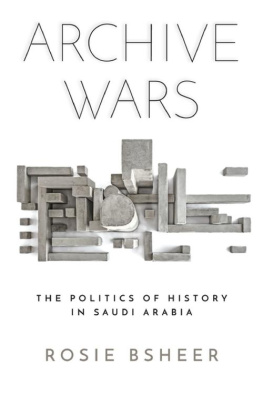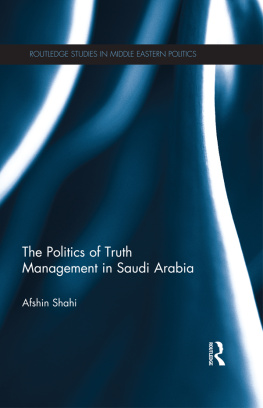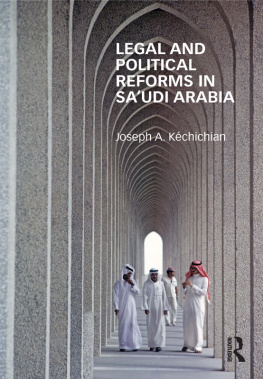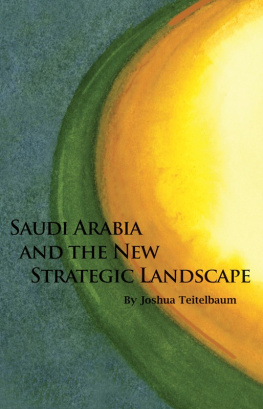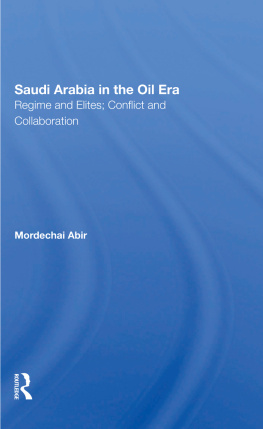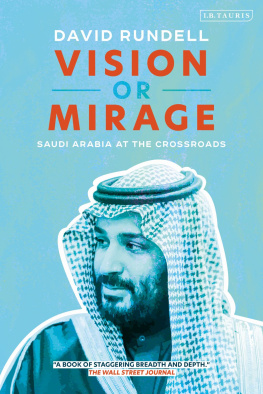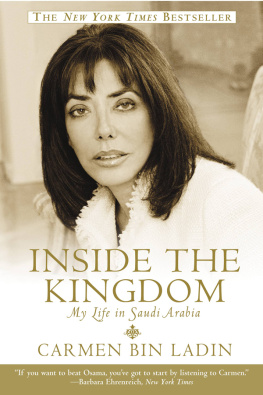Rosie Bsheer - Archive Wars: The Politics of History in Saudi Arabia
Here you can read online Rosie Bsheer - Archive Wars: The Politics of History in Saudi Arabia full text of the book (entire story) in english for free. Download pdf and epub, get meaning, cover and reviews about this ebook. year: 2020, publisher: Stanford University Press, genre: Politics. Description of the work, (preface) as well as reviews are available. Best literature library LitArk.com created for fans of good reading and offers a wide selection of genres:
Romance novel
Science fiction
Adventure
Detective
Science
History
Home and family
Prose
Art
Politics
Computer
Non-fiction
Religion
Business
Children
Humor
Choose a favorite category and find really read worthwhile books. Enjoy immersion in the world of imagination, feel the emotions of the characters or learn something new for yourself, make an fascinating discovery.
- Book:Archive Wars: The Politics of History in Saudi Arabia
- Author:
- Publisher:Stanford University Press
- Genre:
- Year:2020
- Rating:5 / 5
- Favourites:Add to favourites
- Your mark:
- 100
- 1
- 2
- 3
- 4
- 5
Archive Wars: The Politics of History in Saudi Arabia: summary, description and annotation
We offer to read an annotation, description, summary or preface (depends on what the author of the book "Archive Wars: The Politics of History in Saudi Arabia" wrote himself). If you haven't found the necessary information about the book — write in the comments, we will try to find it.
Rosie Bsheer: author's other books
Who wrote Archive Wars: The Politics of History in Saudi Arabia? Find out the surname, the name of the author of the book and a list of all author's works by series.
Archive Wars: The Politics of History in Saudi Arabia — read online for free the complete book (whole text) full work
Below is the text of the book, divided by pages. System saving the place of the last page read, allows you to conveniently read the book "Archive Wars: The Politics of History in Saudi Arabia" online for free, without having to search again every time where you left off. Put a bookmark, and you can go to the page where you finished reading at any time.
Font size:
Interval:
Bookmark:
ARCHIVE WARS
The Politics of History in Saudi Arabia
Rosie Bsheer
STANFORD UNIVERSITY PRESS
Stanford, California
STANFORD UNIVERSITY PRESS
Stanford, California
2020 by Rosie Bsheer. All rights reserved.
No part of this book may be reproduced or transmitted in any form or by any means, electronic or mechanical, including photocopying and recording, or in any information storage or retrieval system without the prior written permission of Stanford University Press.
Printed in the United States of America on acid-free, archival-quality paper
Library of Congress Cataloging-in-Publication Data
Names: Bsheer, Rosie, author.
Title: Archive wars : the politics of history in Saudi Arabia / Rosie Bsheer.
Other titles: Stanford studies in Middle Eastern and Islamic societies and cultures.
Description: Stanford, California : Stanford University Press, 2020. | Series: Stanford studies in Middle Eastern and Islamic societies and cultures | Includes bibliographical references and index.
Identifiers: LCCN 2019051739 (print) | LCCN 2019051740 (ebook) | ISBN 9781503605183 (cloth) | ISBN 9781503612570 (paperback) | ISBN 9781503612587 (ebook)
Subjects: LCSH: ArchivesSaudi ArabiaHistory. | Historic preservationSaudi Arabia. | Urban renewalSaudi Arabia. | Saudi ArabiaHistoryStudy and teaching. | Saudi ArabiaHistoriography.
Classification: LCC DS222.92 .B74 2020 (print) | LCC DS222.92 (ebook) | DDC 026/.9538dc23
LC record available at https://lccn.loc.gov/2019051739
LC ebook record available at https://lccn.loc.gov/2019051740
Cover art: Nasser Al Salem, They Will Be Seen Competing In Constructing Lofty Buildings, 2014, 58 x 90 x 35 cm
Cover design: Rob Ehle
Typeset by Newgen in Brill 10/14.4
Stanford Studies in Middle Eastern and Islamic Societies and Cultures
In loving memory of Khalil Bsheer (19491987)
Selection is a necessary feature of any historical story, and there can be no such thing as definitive or exhaustive history, however much space the historian takes to write about any passage of the past. What we select inevitably represents our interests, even if we aim all the while to tell it like it really was. That is to say, there is inevitably something of us in the stories we tell about the past. This is the historian's predicament, and it is foolish to think there is some method, however well intentioned, that can extricate us from this predicament.
Steven Shapin, The Scientific Revolution (1996)
Contents
Preface
On September 6, 2004, Saudi Arabias defense minister Sultan ibn Abdulaziz responded to media pundits with a most peculiar comment: The Saudi government is committed to cooperating with the United States in the global war on terrorism. We have altered 7 percent of the content of our religious textbooks and removed all the objectionable material deemed offensive to other religions. We will continue to cooperate with the international community, but be advised... we will never touch our history textbooks. The consequences of doing so are too grave. Religious textbooks, they charged, had produced violent subjects capable of committing heinous crimes. While they demanded the removal of the bigoted content from the religious textbooks, they made no mention of the countrys official history; it remained outside the purview of international scrutiny. Yet the late Prince Sultan (d. 2011) felt the need to publicly draw a red line at disciplinary history, warning of the gravity of altering the historical narrative and not the ostensibly more salient religious one.
Even though the relationship between secular and religious powers in Saudi Arabia was often contentious, dissonance between the two was rarely publicized in such a manner, let alone to the detriment of religious discourse. I wondered what had compelled one of the most powerful rulers of the self-proclaimed Islamic In the past, state clerics had opposed the move, as well as the official recognition of nonreligious events. This time, the royal order passed without incident, despite the unfamiliar fanfare and street celebrations that marked the events first official commemoration in 2005. The order was one of many that subsequently countered conventional religious sensibilities in Saudi Arabia. Coupled with the defense ministers statement, the measures were striking. They privileged secular history and curbed the authority of the religious establishment. The measures also came on the heels of a major expansion project in the holy city of Mecca that saw the mass destruction of Islamic heritage. If history came to publicly matter in the opening years of the twenty-first century, clearly some histories mattered more than others.
I came across the defense ministers statement in 2005, while conducting research on the politics of historical production in Saudi Arabia. Initially, I traced shifts and elisions in the state-sanctioned historical discourse by exploring the different editions of Saudi Arabian history textbooks that the Ministry of Education had issued since the centralization of education in 1970. These shifts largely reflected developments in the political economy and the attendant requirements of Saudi Arabian subject formation. They also spoke to the protracted power struggles over the Ministry of Education, which state clerics had largely commanded. While oil, remarkably, is barely mentioned in history textbooks, and then only in the context of being a sign of Gods blessing (nima) on Al Saud, religion appeared to be a central unifying force. This remained the case throughout the 1980s and into the 1990s. In subsequent decades, however, the importance of religion to the making of the Saudi state and its citizens became less and less important. This challenged most of what I had read about Saudi Arabia until then, which prepared me even less for the realities I encountered on the ground when I moved there a few years later.
Navigating an unfamiliar research terrain as I traveled from the capital, Riyadh, to Mecca and Medina in the west and Qatif and Dhahran in the east impressed upon me just how present the past was in peoples everyday lives. This was most visible in Riyadh, where a heritage industrymuseums, archives, and historical siteswas well on its way, if still in the making, by the late 2000s. But it was also palpable in the hours-long discussions I had with the hundreds of Saudi Arabians who readily welcomed me into their homes and offices. No matter the topic or the interlocutors political dispositions, the conversation always involved some discussion of the politics of the past. History, it seemed, was on everybodys minds, and many were eager to talk about it. My discussions with ordinary Saudi Arabians, intellectuals, activists, and journalists featured two interrelated issues that stood out as especially odd.
The first was a refrain that recurred regardless of ones class, profession, or political persuasion: They, referring to Al Saud, have no history. Even a high-ranking Saudi diplomat, surprised at my desire to conduct research in Saudi Arabia, asked: What is there to study in Saudi Arabia? Not waiting for an answer, he remarked, We have no history. He was alluding to the idea that with one sanctioned historical narrative, there was nothing else to research. It was a futile endeavor. More often than not, the tone and intended meaning of the statement varied according to ones politics and view of the past. At times, the claim served to rationalize the states grandiose investments in the production of historical artifacts and spaces in Riyadh. Accordingly, doing so necessitated and thus justified demolishing historical sites elsewhere. At other times, the charge was critical and disparaging of the violent politics of erasure that aimed to enshrine a singular history out of many.
Next pageFont size:
Interval:
Bookmark:
Similar books «Archive Wars: The Politics of History in Saudi Arabia»
Look at similar books to Archive Wars: The Politics of History in Saudi Arabia. We have selected literature similar in name and meaning in the hope of providing readers with more options to find new, interesting, not yet read works.
Discussion, reviews of the book Archive Wars: The Politics of History in Saudi Arabia and just readers' own opinions. Leave your comments, write what you think about the work, its meaning or the main characters. Specify what exactly you liked and what you didn't like, and why you think so.

